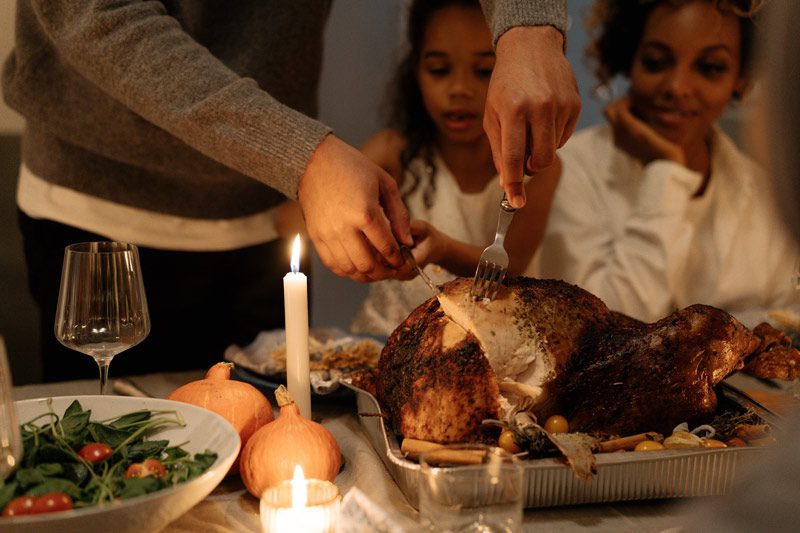In the United States, Thanksgiving is traditionally viewed as the start of the holiday season. However, the rising popularity of Halloween has lengthened the season by at least a month. Between the decorating frenzy of the highly devoted “spooky season” lovers and the inflatable Santas, lights, and wreaths that start appearing in early November, Thanksgiving can begin to feel like a “filler” holiday that gets lost in the middle. Yet, there is still much worth celebrating about the idea of saying–and giving–thanks.
Gratitude has many surprising benefits that just might put “turkey day” higher on your radar than ever before. While the holidays are known to be notoriously stressful and overwhelming, that doesn’t mean you should have to suffer. Here are three ways gratitude benefits you—and how to keep those benefits going all year long.
BENEFIT #1: IT MAKES YOU HEALTHIER
Expressing and experiencing gratitude can make a huge difference in your physical and mental health. When you spend less time focused on yourself and give more to those around you than you receive, you will likely feel a sense of accomplishment, joy, and serenity. Like a post-workout high, expressing gratitude can release endorphins that bring on a euphoric feeling. You’ll instantly feel a greater sense of self-worth knowing you are helping instill confidence and happiness in others.
People who regularly practice gratitude spend less time at the doctor’s office, exercise more frequently (which has its own benefits), and get superior sleep. With such profound, full-body effects, incorporating gratitude into your routine could change your life. Lessened fatigue, lower blood pressure, and many other potential health effects are highly correlated to gratitude practice. When you learn to release and rid yourself of toxic, negative energy, the associated pent-up anger, frustration, and animosity leave with it. Muscle tightness is alleviated, tension headaches become less frequent, and body dissatisfaction is mitigated. It’s this mind-body clarity that makes gratitude practice so powerful, potent, and radical.
November 29th is Giving Tuesday
You can show your gratitude for rtor.org by making a tax-deductible contribution to Laurel House, Inc., the sponsor of this website, so we can keep giving resources to recover to those in need.
Laurel House, Inc. is a 501 (c)(3) nonprofit organization.
BENEFIT #2: IT MAKES YOU HAPPIER
Studies have shown that gratitude can strengthen and improve relationships, increase self-esteem, and even boost your mood. Showing your partner your appreciation for the little things can go a long way. Instead of nagging, nit-picking, and complaining, you’ll become more grateful and appreciative. Your empathy and compassion for each other will grow. You might find yourself in fewer fights and even stop sweating the tiny, insignificant things. Your newfound optimism will propel you into a territory of relationship bliss. When you feel such a high level of security with your romantic partner, you’ll start to feel this blend into your friendships and other aspects of your life. Your mindset will be deeply affected and shift, and what you previously took for granted will be replaced with a newfound sense of thankfulness.
While it is normal to experience feelings of low mood, sadness, and even anxiety from time to time, it is important to take action if you find these feelings are persistent or causing trouble in your day-to-day life. Along with practicing gratitude, it might help to seek outside care by talking to your doctor or considering the different types of therapy as available options. There is always room to grow and improve, and sometimes you go through periods when you need a bit of extra encouragement and assistance. Talking to someone outside your usual circle of family and friends can be just the cathartic release you need.
BENEFIT #3: IT MAKES YOU STRONGER
Resilience can be hard to master, but gratitude can help you get there. By elevating the mundane and creating positive associations with everyday life events, you can better prepare yourself for unforeseen hardships. When challenges are thrown your way, how you react and adapt is what matters most. Drawing on your inner strength, charisma, optimism, and courage will help propel you forward when times get tough. Try these exercises:
- When you wake up in the morning, instead of starting the day with dread or overwhelm, change the narrative. Begin a gratitude journal and list what you are excited about and thankful for. Here, lying within the pages of your notebook, you’ll notice how resilient you really are.
- Start setting realistic goals and work towards them. Don’t let fear, outside doubt, or other people’s opinions stop you—keep going. Even if it is just a list of your daily to-dos, being able to check things off will help you feel accomplished and fulfilled.
- Use past setbacks as learning opportunities. Challenge yourself to take these roadblocks in stride, mere stepping stones along the way. Gratitude practice will teach you that a closed door always leads to a new one opening.
Gratitude is a learned behavior. It takes practice, time, and patience to adjust your thought patterns. Start small and gradually adjust. Give yourself grace—you will make mistakes. There is no right or wrong way to give thanks. Just the mere act of starting takes courage, and you’ve already made the leap. Push yourself to be proactive, fearless, and optimistic (even when it seems infinitely hard to do so.) You will thank yourself later.
Photo by cottonbro studio: https://www.pexels.com/photo/man-in-gray-sweater-holding-knife-and-fork-slicing-meat-5791480/
Recommended for You
- Back to School Support for New Canaan College Students with Mental Health Conditions - July 11, 2023
- Showing Gratitude on Thanksgiving: How a Favorite Holiday Can Help Your Mental Health - November 23, 2022
- rtor.org Celebrates Dr. Martin Luther King, Jr. - January 18, 2021





